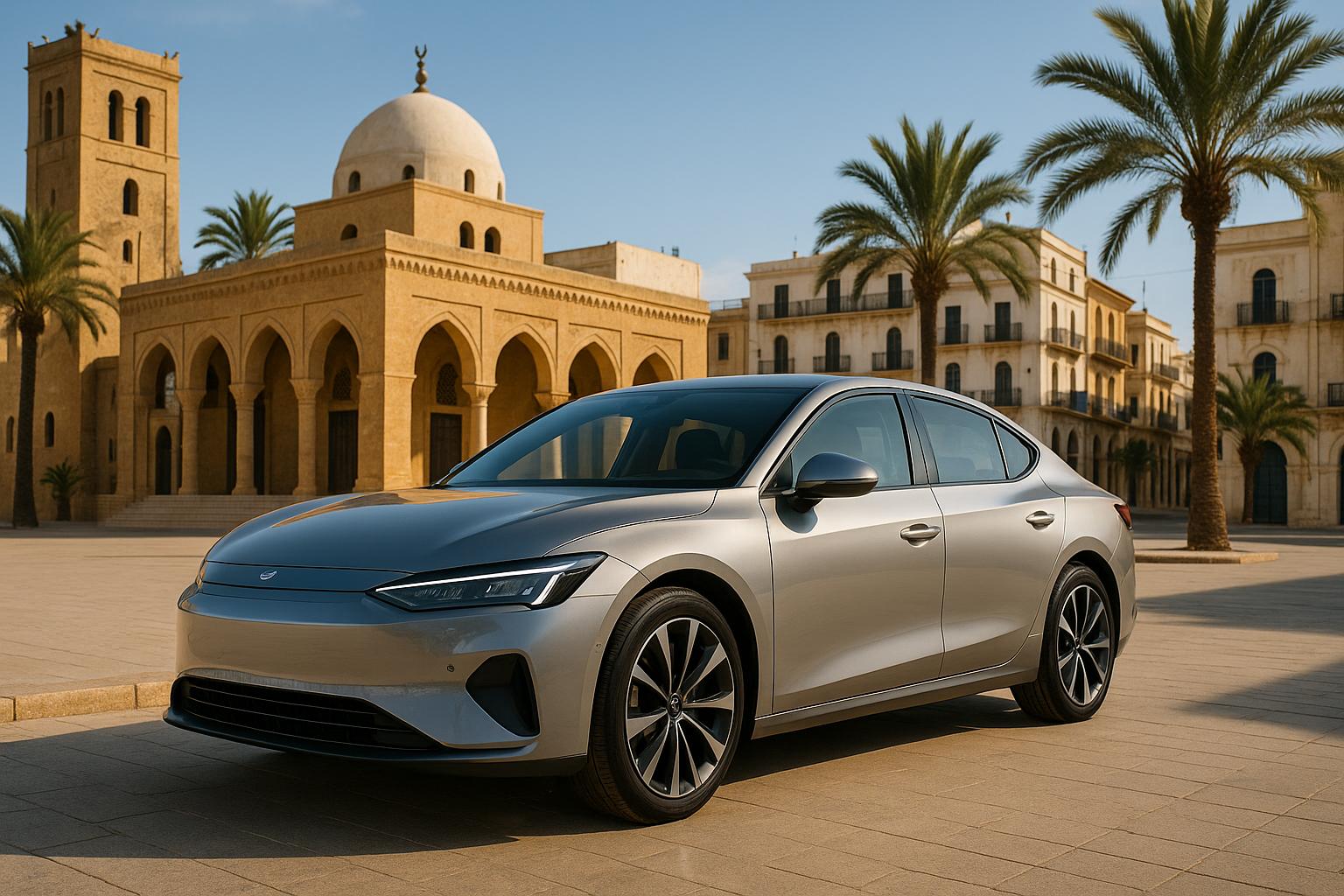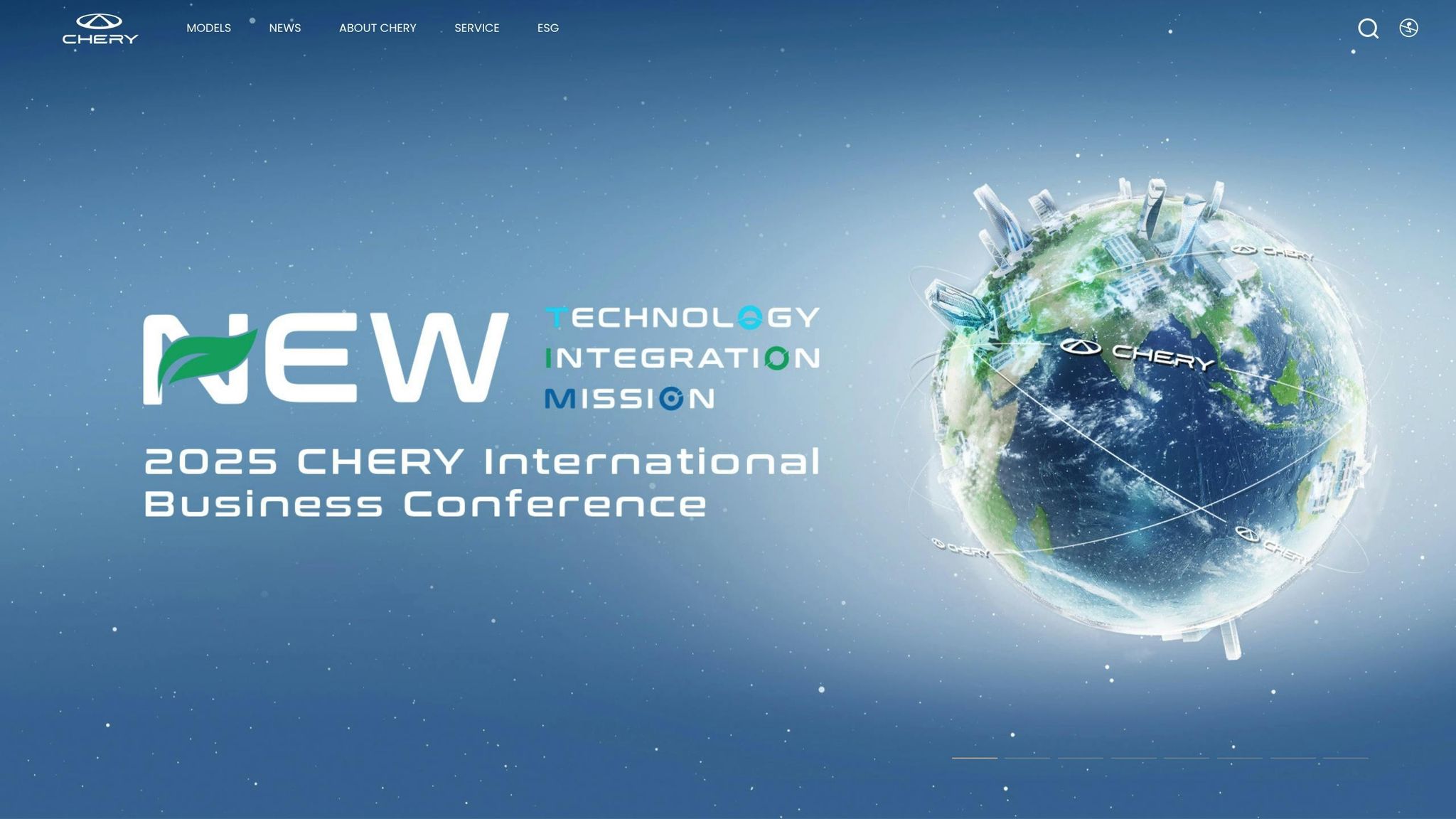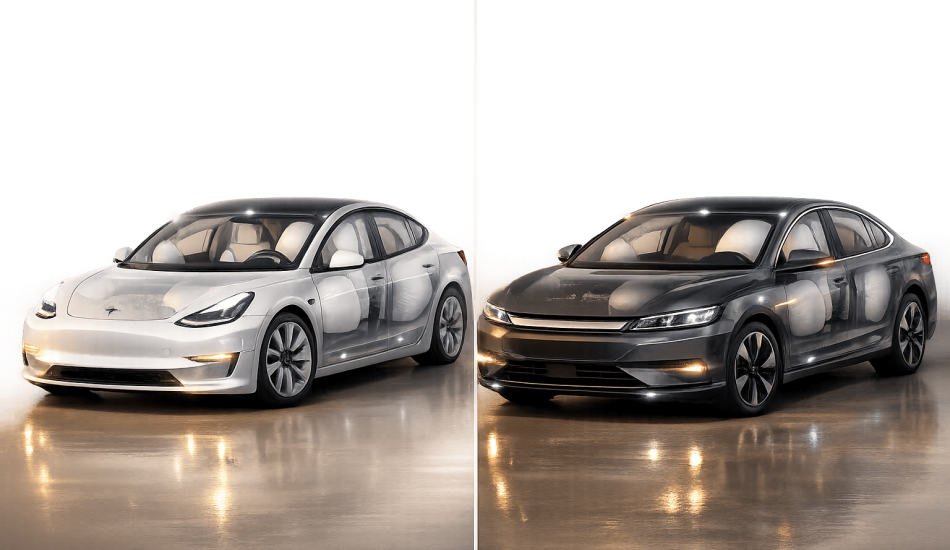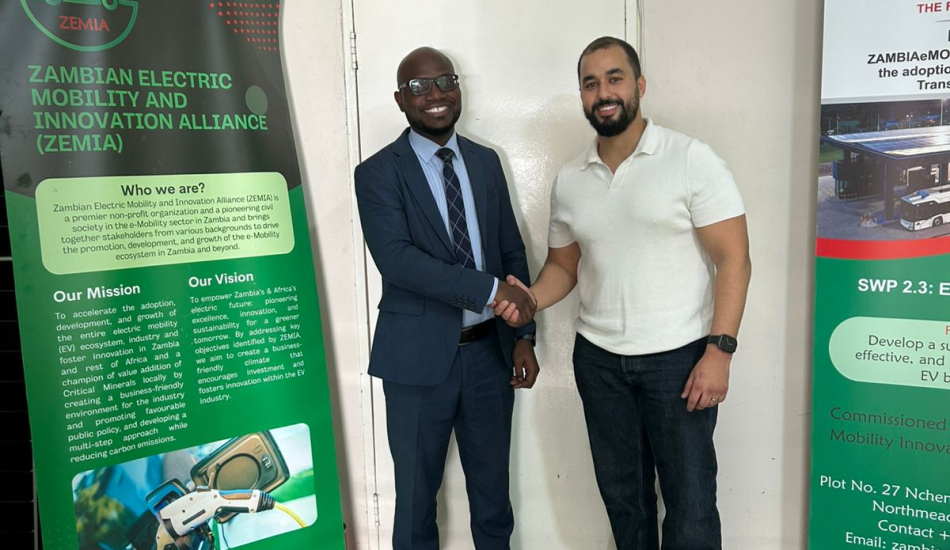
Algeria is moving toward electric mobility with growing options for electric vehicles (EVs) and government support. Here’s what you need to know:
- Local EVs: Algeria’s first homegrown EV prototype costs around $5,000 and is lightweight, making it energy-efficient.
- Imported EVs: Brands like Tesla, BYD, Volkswagen, and Dongfeng are available via platforms like EV24.africa.
- Two-Wheelers: Affordable electric scooters and bikes (starting at $101) are popular for urban mobility.
- Government Incentives: Buyers get a 20% subsidy, reduced taxes, and support for home charging installations.
- Charging Infrastructure: 1,000 public charging stations are planned by 2025, with subsidies for home chargers.
Algeria aims to electrify 30% of its vehicle fleet by 2030, supported by subsidies, tax cuts, and expanding infrastructure. Whether you buy locally or import, EV adoption is becoming easier and more affordable.
First Look ! 2023 CHERY eQ1 – EV | Interior and Exterior

Electric Vehicle Models Available in Algeria
Algeria’s electric vehicle (EV) market is still in its infancy, featuring a mix of affordable local prototypes, imported brands, and practical two-wheeler options.
Locally Made EVs
Oussama Touaba has introduced Algeria’s first homegrown electric car prototype, a notable step forward for the country’s automotive sector.
Touaba’s prototype is built with a lightweight aluminum frame, tipping the scales at just 440 pounds (200 kilograms). This design not only cuts down on weight but also boosts energy efficiency and driving range. Perhaps the most appealing aspect is its projected affordability – mass production could bring the unit cost down to approximately $5,000.
Touaba envisions this vehicle reaching both domestic and international markets. However, the project currently requires funding to transition from prototype to large-scale production. This initiative highlights Algeria’s potential to create affordable and efficient electric mobility solutions tailored to its economic and regional needs.
While local innovations like this are promising, the market also includes imported EV options.
Imported Electric Vehicle Brands
At present, Dongfeng is the only brand with reported EV sales in Algeria. The Chinese manufacturer has begun to establish a presence, though its market share and sales figures remain modest compared to traditional vehicles.
The limited availability of imported EVs reflects the early development stage of Algeria’s EV market. However, as government policies increasingly promote EV adoption, more international brands are expected to enter the market, recognizing North Africa’s potential for growth in this sector.
Beyond four-wheeled EVs, two-wheelers are gaining traction as a practical solution for urban mobility.
Hybrid and Electric Two-Wheelers
Electric two-wheelers are becoming an integral part of Algeria’s clean energy transition, with studies underway to explore the expansion of this segment.
Rooder Technology Co., Ltd. plays a significant role in Algeria’s electric two-wheeler market. The company produces a variety of electric scooters and bikes, with an annual manufacturing capacity of 20,000 electric scooters and 15,000 electric bikes. Their electric motorcycles are increasingly popular among Algerian consumers for their efficiency and eco-friendly design.
For instance, Rooder offers electric motorcycle scooters (model r1020) priced between $218.00 and $242.00, while their discount electric scooters (model r1000) range from $101.00 to $126.00.
Sales data shows a steady rise in interest, with electric scooter sales growing in Algeria as the government pushes for sustainable transportation. This aligns with the country’s ambitious goal of transitioning 30% of its vehicle fleet to clean energy by 2030, encompassing not only electric cars but also LPG/C, hybrid, and plug-in hybrid vehicles.
Electric two-wheelers offer several advantages for Algerians, including affordability, minimal reliance on charging infrastructure, and practicality for navigating congested urban areas. As government policies and infrastructure continue to evolve, two-wheelers could play a pivotal role in accelerating EV adoption, shaping Algeria’s emerging electric vehicle market.
How to Buy an Electric Vehicle in Algeria
Purchasing an electric vehicle (EV) in Algeria is an evolving process, shaped by a mix of traditional dealership networks and modern online import platforms. Whether you go through authorized dealers or choose to import online, understanding the available options and regulations is key.
Dealership and Online Purchase Options
Historically, Algeria’s dealership network has focused on conventional vehicles. However, in March 2023, the government authorized dealers like Fiat (Italy), JAC (China), and Opel (Germany) to import vehicles. By the end of the year, plans included bringing in 40,000 Fiat cars and 10,000 JAC vehicles. While these imports are currently centered on traditional models, the introduction of electric vehicles is expected as demand increases.
For those looking for a broader selection, EV24.africa offers an online platform dedicated to EV purchases in Algeria. This platform connects buyers to a wide range of electric vehicles from Europe, Asia (especially China), North America, and Japan. Available brands include Tesla, BYD, Volkswagen, XPeng, Leapmotor, Changan, Wuling, Mercedes-Benz, Citroën, and Peugeot. EV24.africa takes care of the entire import process, adhering to international commercial terms, with most vehicles arriving at the Port of Algiers, simplifying what could otherwise be a complicated process.
Additionally, the future of EV production in Algeria looks promising. Geely has announced plans for a $200 million assembly plant with a capacity of 50,000 cars, aiming to roll out its first model by 2026. Chery is also set to open a factory in Bordj Bou Arreridj by October 2025.
These channels provide options for buyers, but importing EVs comes with its own set of procedures and regulations.
Importing EVs: Rules and Procedures
For those choosing to import an EV, understanding Algeria’s strict import rules is essential. Algerian citizens are allowed to import one used vehicle every three years for personal use, provided the payment is made in personal foreign currency.
There are additional requirements for used vehicles:
- The car must be less than three years old.
- Safety features like ABS and speed limiters are mandatory.
- Required documents include a Certificate of Conformity (to confirm the vehicle is "Used"), a Technical Inspection Certificate, and a Border Police Certificate.
All transactions must go through Algerian banks, and vehicles must be left-hand drive.
Import costs can add up quickly. Shipping a vehicle from China to Algeria costs between $2,500 and $3,000 per container. Import duties range from 15% to 30%, depending on the car’s value, but electric vehicles benefit from reduced taxation: 30% import duty, 2% PRCT, 2% TCS, 0% TIC, and 19% VAT.
Financing and Subsidy Programs
To encourage the adoption of EVs, the Algerian government has introduced financial incentives and infrastructure plans. By 2030, the goal is to have 1.2 million electric and hybrid vehicles, making up about 10% of the total vehicle fleet.
A new aid program starting in 2024 offers bonuses for EV purchases and the installation of personal charging stations. Additionally, Aprue (Agency for the Promotion and Rationalization of Energy Use) provides a 20% subsidy for those installing domestic charging stations. Eligibility requires ownership of an electric or plug-in hybrid vehicle, a residence in an urban area, and a compatible electrical setup (single-phase or three-phase).
The government is also working with financial institutions to improve access to credit, offering interest rate subsidies and loan guarantees for underbanked consumers. Meeting the 2030 target will also involve building 100,000 charging stations. Aprue’s plan allocates 30% of these for public use, 30% for domestic installations, and 40% for companies and residential areas.
With expanding infrastructure, financial support, and streamlined processes, Algeria is paving the way for a smoother transition to electric mobility, making EV ownership more accessible and affordable for its citizens.
Charging Infrastructure in Algeria
Algeria is steadily growing its charging infrastructure as part of a national strategy led by Sonelgaz, the state-owned electricity and gas company. The plan focuses on building a robust domestic charging network while also developing export opportunities for charging technologies. This dual approach reflects Algeria’s ambitions to enhance local convenience while competing in international markets.
Public Charging Networks
Sonelgaz is spearheading efforts to establish a nationwide network of public charging stations, targeting urban hubs as well as rural areas to ensure broad accessibility. The goal is to have 1,000 charging stations operational by 2025. To support this, SAIG (The Algerian Company of Electric and Gas Industries) is manufacturing these charging stations locally, reinforcing Algeria’s self-reliance in this sector.
Home Charging Installation
For EV owners, home charging is becoming more accessible thanks to government subsidies. Aprue, a government agency, offers a 20% subsidy for those installing home charging stations. To qualify, you must own an electric or plug-in hybrid vehicle, live in an urban area, and have a suitable electrical setup, either single-phase or three-phase. The government aims to facilitate the installation of 30,000 home charging units by 2030 as part of its broader strategy.
The process begins with a suitability survey to determine if your home can support a charging station. Key considerations include having off-street parking and an adequate power supply. Installation costs vary based on your home’s electrical setup. Basic installations requiring minimal adjustments cost around $600, while more complex setups involving grid modifications can range from $2,000 to $4,000. The charging units themselves can cost anywhere from a few hundred to several thousand dollars, depending on their features and capacity.
"Before you purchase your vehicle, our preferred home charging providers will help you check the suitability of your property. Installation can depend on factors including the age of your property, availability of private off-street parking and an appropriate power supply." – Land Rover Algeria
Export of Charging Technologies
Algeria isn’t just focused on internal development – it’s also making strides in exporting charging technologies. The country has established itself as a regional leader in manufacturing and exporting charging stations. In September 2024, SAIG exported 433 charging stations to Italy and Libya, offering medium-range units with 60 kW capacity and fast-charging units with 322 kW capacity. This export initiative not only strengthens Algeria’s economic diversification beyond oil but also boosts its role in the global EV market.
Additionally, by producing charging stations domestically, Algeria reduces reliance on imports, giving the country greater control over costs and supply chains. Sonelgaz is also collaborating with Algerian research centers to develop lithium battery prototypes, with plans to industrialize battery technology alongside its charging infrastructure.
sbb-itb-99e19e3
Government Support and Incentives for EV Adoption
Algeria is at the forefront of encouraging electric vehicle (EV) adoption in the region, using targeted policies and incentives to reshape its transportation landscape.
2030 Energy Transition Goals
By 2030, Algeria plans to transition 30% of its vehicle fleet to clean energy sources. This ambitious goal is part of a broader strategy to cut greenhouse gas emissions and boost the use of renewable energy. These objectives form the foundation for financial and regulatory measures designed to create a thriving EV market in the country.
Tax and Subsidy Benefits
To make EVs more accessible and accelerate their adoption, Algeria has introduced several fiscal incentives.
Electric vehicles benefit from a reduction of up to 80% in customs duties and taxes, along with a 20% subsidy. As the government phases out subsidies for fossil fuels, EVs are becoming a more cost-effective option compared to traditional gasoline-powered vehicles. Additionally, a decree issued on February 22, 2023, allows private individuals to import tourist and commercial vehicles under three years old and weighing less than 3.5 tons, with certain restrictions on diesel engines.
These measures are part of a comprehensive approach that also includes expanding charging networks and enhancing support for EV owners, ensuring a smoother transition to cleaner transportation.
Electric Vehicle Ownership and Maintenance
Owning an electric vehicle (EV) in Algeria comes with unique considerations. By understanding proper maintenance practices, you can ensure your EV performs reliably and efficiently, even in the country’s varied climate conditions.
Battery Management and Recycling
EV batteries typically last between 12 and 15 years or 100,000 to 200,000 miles, with an average annual degradation rate of 1.8%. To extend battery life, it’s best to keep the charge level between 20% and 80% for daily use and limit frequent rapid charging, especially in Algeria’s hot climate. Parking in shaded or covered areas also helps protect battery performance from extreme temperatures.
As one Kia expert explains:
"Even though a full charge will give you the maximum operating time, it is never a good idea for the overall lifespan of your battery."
Algeria’s high temperatures pose specific challenges for EV batteries, as extreme heat can shorten battery life and reduce driving range. To mitigate these effects, use Level 2 home chargers for routine overnight charging instead of relying heavily on DC fast chargers, which can accelerate battery wear in warmer conditions.
Kia also emphasizes:
"Keep your EV battery from extreme temperatures and do not rush while charging, and you are not powerless to expand your battery life."
In addition, regular software updates, following your EV’s maintenance schedule, and adopting gentle driving habits all contribute to better battery health. For long-term storage, maintain the battery charge between 25% and 75% to preserve its condition.
Service and Maintenance Networks
EV ownership in Algeria is becoming more convenient thanks to a growing network of service and maintenance options. For example, Jaguar Algeria offers comprehensive service plans that include trained technicians, advanced equipment, and genuine parts. These plans are transferable to new owners, boosting resale value and providing assurance for used EV buyers.
On the infrastructure side, companies like Diebold Nixdorf support EV owners by installing and maintaining charging stations. They work closely with manufacturers and charge point operators to ensure equipment remains operational and up-to-date. Online tools like PlugShare make it easy to locate charging stations in cities like Algiers, where EV infrastructure is steadily expanding. By the end of 2021, nearly 100 Naftal service stations had been equipped with EV charging points.
Specialized Electric Vehicle Service Providers (EVSPs) are also stepping in to deliver comprehensive charging solutions. Meanwhile, GIREVE offers charging roaming services, connecting different networks to simplify operations for both service providers and drivers. A well-maintained EV, supported by this growing ecosystem, ensures reliability and can lead to long-term cost savings.
Cost Comparison: Electricity vs. Fuel
One of the most appealing aspects of EV ownership is the potential for significant fuel cost savings. In Algeria, understanding these savings involves looking at both short-term expenditures and long-term benefits. Using a levelized cost approach – factoring in driving habits and vehicle age – provides a clearer financial comparison.
In the United States, for instance, the national average cost of charging is $0.15 per kWh for battery EVs and $0.14 per kWh for plug-in hybrids. Over a 15-year period, this translates to fuel cost savings ranging from $3,000 to $10,500 compared to gasoline-powered vehicles.
These savings grow even more substantial for drivers with medium to high annual mileage. For such users, battery electric vehicles become an economically attractive choice, particularly over 12- or 15-year ownership periods.
Conclusion: Algeria’s Path to Electric Mobility
Algeria is at a turning point in its journey toward electric mobility. While the electric vehicle (EV) sector is still in its early stages, the groundwork is being laid at a promising pace. The country’s passenger car market is expected to hit $3.3 billion by 2025, with steady growth projected through 2029. As consumer preferences shift toward fuel-efficient and environmentally conscious vehicles, the demand for electric and hybrid options continues to rise. Algeria’s ambitious energy goals for 2030 include converting 30% of its vehicle fleet to clean energy and electrifying 1.2 million vehicles – 10% of the total fleet.
To support this transition, the government is offering financial incentives, including a 20% subsidy for EV users and tax reductions of up to 80% on electric vehicles. Plans for infrastructure development are equally ambitious, with a goal of establishing 100,000 charging stations by 2030. Of these, 30,000 will be for home use, while the rest will be strategically distributed across public spaces, businesses, and residential areas. These measures aim to make EV adoption more accessible and appealing for consumers.
For those ready to make the switch, platforms like EV24.africa are simplifying the process. They provide end-to-end services, including delivery across Algeria, access to top brands like Tesla, BYD, and Volkswagen, and assistance with customs clearance and registration. With a team of over 200 professionals operating in five African countries, EV24.africa emphasizes:
"At EV24.africa, customer satisfaction is our top priority"
Algeria’s progress hinges on the alignment of government policies, infrastructure development, and accessible purchasing options. While obstacles remain, the country’s commitment to sustainable transportation, combined with growing consumer interest and supportive services, sets the stage for meaningful advancements in EV adoption over the next decade. Together, these efforts are steering Algeria toward a cleaner, more sustainable future in mobility.
FAQs
What are the key steps to import an electric vehicle into Algeria?
To bring an electric vehicle (EV) into Algeria, there are several key steps you’ll need to take. Start by obtaining an Import Export Code (IEC) from the Directorate General of Foreign Trade. It’s also crucial to ensure that the vehicle complies with Algeria’s safety standards, such as being equipped with an anti-lock braking system (ABS). Next, secure prior authorization from the Ministry of Industry and gather all necessary documents, including a Certificate of Conformity.
Once you have all the paperwork in order, notify Algerian Customs about your plan to import the EV. Be prepared to pay customs duties and taxes, though these may be reduced for electric vehicles. After the vehicle arrives in Algeria, complete the registration process to finalize ownership. Following these steps will help you navigate the process smoothly and get your EV on the road.
What incentives and infrastructure is the Algerian government providing to encourage electric vehicle adoption?
The Algerian government is taking steps to promote the use of electric vehicles (EVs) by introducing tax breaks and subsidies for buyers. These financial perks aim to make EVs more affordable and appealing to a wider range of consumers.
To further encourage EV adoption, the government is ramping up its investment in charging infrastructure. By 2030, they plan to set up 30,000 EV charging stations across the country. On top of that, EV owners can take advantage of a 20% subsidy on charging costs, helping to lower the ongoing expenses tied to owning and operating an electric vehicle.
These initiatives align with Algeria’s broader goals of advancing sustainable transportation and reducing reliance on fossil fuels.
What should I know before installing a home charging station for my electric vehicle in Algeria?
Installing a home charging station for your electric vehicle in Algeria takes some thoughtful preparation to get it right. Start by picking a spot that’s convenient – ideally near your parking area and protected from extreme weather. This makes daily charging more practical and keeps your equipment in good condition.
Next, make sure your home’s electrical system can handle the extra demand. In some cases, you might need to upgrade your system to avoid overloading it. It’s also essential to review local regulations and obtain any necessary permits to ensure you’re meeting safety and legal requirements.
When choosing a charger, consider your needs. Level 1 chargers are budget-friendly but take longer to charge, while Level 2 chargers are faster and more efficient, though they come at a higher cost. Whichever you choose, always hire a professional electrician for the installation. This guarantees the setup is safe and complies with all electrical codes.




